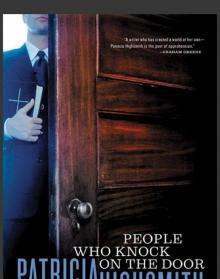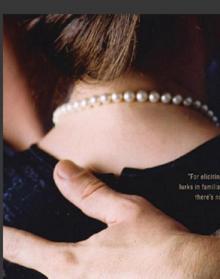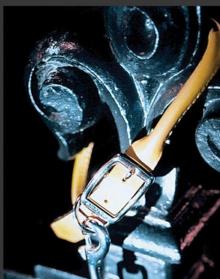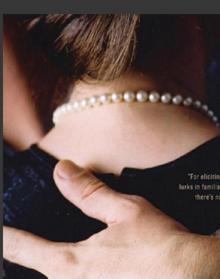- Home
- Patricia Highsmith
Nothing That Meets the Eye Page 6
Nothing That Meets the Eye Read online
Page 6
“Lonely? I’m never lonely!”
She only smiled at him now, and he did not know what to make of the smile.
“No, I’m not lonely!” He laughed, feeling that such an admission would be a weakness, as though loneliness were a disease which even when cured left some unattractive trace.
She said nothing. Now the smile was gone and only the corner of her mouth was drawn up a little, with what expression Hildebrandt could not see, for her head was bent over the table.
“At any rate, have you had dinner?”
“Yes, thanks.”
“I wish I’d thought to ask you last night.”
“But I had an engagement.”
“You might have broken it.”
“No, a business engagement.”
“Business?”
“Legal business.”
“Oh?”
“Tell me what you do on Sundays.”
Hildebrandt smiled, wanting to embrace her. “But I’m very curious about you.”
She reached for a cigarette. “I’m here to settle some accounts—having just got a divorce.”
“Oh, I see,” he said subduedly, while within he fell into small quiet pieces. He realized he had thought of her as isolated from everyone but himself. If she had had a frame in his mind, it was that of the magic casements and the red and gold lobby beyond. Now all at once she was estranged, and to learn more of her was to risk thrusting her yet farther away.
“Do you have any children?”
“No.” She smiled at him. “I’m quite free. I suppose I can’t believe it yet.”
Hildebrandt relaxed. In the moment of crisis the magic of the casements had all but left her. She had been the divorced wife of another man, the former mistress of a household in San Francisco. He might have ceased to love her, he thought, but instead, his love had metamorphosed to one that loved her as a creature of reality. He felt he had become real himself. He had risen suddenly far above the dreary gentleman-at-the-bar.
He sat upright, solicitous, beside her. “Could I ask you—if I’ve a right—to tell me about it?”
“No, don’t ask me that!” she said with a laugh.
Hildebrandt watched her face return to its poised, somewhat preoccupied expression. He saw, despite his love for her, the distance that separated them now unless he could span it somehow. Yet this was not the time, either, to tell her he loved her. He wondered if her husband had been cruel to her. Or unfaithful. Or if he had given her the scar on her cheek! He wanted to hunt down the monster and kill him!
“Is there nothing I can do?” he asked searchingly. “I do wish you’d tell me even the least important things, if you will.”
“The least important things are the least important things—like my name. And the most important thing I think you know.”
“No, I don’t.”
She was silent again, and Hildebrandt continued. “I just can’t bear to see you unhappy.”
“But I am not so unhappy.”
He pondered her reply as though it had been a riddle.
III
She was more than an hour late. Hildebrandt, scanning the people who walked from right and left on the sidewalk, paced once more across the long cement step. He dared not leave to call the St. Regis, for it had now reached a time at which she, arriving and not finding him, might think he had grown tired of waiting and gone away.
“Of course she will come!” Hildebrandt said to himself. “She has never failed, has she?” He could look back on the one occasion, last evening, when she had kept their appointment in the Pandora Room. And because she had been later than he expected, he told himself she was probably late for all her engagements.
“You may think this is funny,” he could still hear her say. “I wanted to go to the Metropolitan while I was here.”
And he had assured her he could take the afternoon off and go with her. He had begged her, in fact, to let him see her today, because last night while they had had eggs and toast at midnight in the sandwich shop, she had said something— He could not quite remember it. Something like, “You mustn’t think I’ve cured loneliness in you. Only someone who’s never known it can cure it.” And while he had laughed at her theory, it had hurt him, because he had realized she might be saying in this way that she knew he was inadequate to cure her own loneliness, to give her what she needed, perhaps in the way that mattered to her was inferior to the man who had been her husband.
But these doubts had vanished before the promise of the afternoon at the Metropolitan, which last night had seemed a gay adventure. He would learn, later when they took tea in some quiet place, all the things it was absurd he did not know already, her name, when she would come back from San Francisco and why she had to go in the first place. He would tell her then that he loved her. He would begin all over again, somewhere besides the Pandora Room, as though he had never been lonely or inadequate.
The museum had been enchanted by her presence when he had run up the steps at three o’clock to search the lobby. Now the place was melancholy. He found himself staring at a man who walked down the steps with a small boy on either hand, and only when they reached the sidewalk did he remember he had seen them go in at three o’clock. He paced slowly back along the broad step.
Even in the outdoors, with the collar of his black overcoat thrown up carelessly, his tapered face below the gray homburg stiffened against the cold twilight, he was the gentleman-at-the-bar, the anxiety of waiting but externalized upon his face by the discomfort of chill. There was a finicalness in the rigidity of his arm, the gloved hand that held the other glove, and in the precise click of his heels. He might have been impatient at having been delayed in reaching his bar at his usual hour.
He could not endure the scene any longer. The gap between three and five on the face of his watch seemed enormous. He ran down the steps and began walking south on Fifth Avenue, still watching both sides of the street, still turning to inspect taxis that drew up.
He tried to outstrip the darkness, for it seemed if he should reach the hotel before dark, it would be still afternoon, still conceivable she had been only delayed. She might, as he walked into the lobby, be coming from an elevator to meet him.
When he turned the corner and saw the hotel, he began running toward it. He expected at every second to see her. He glanced around the lobby, then went to the desk.
“Listen,” he said to the clerk, “can you tell me the name of a woman who’s staying here whose initials are H.C.? Miss H.C., I think. Matter of fact, I’m not sure of the C.” He began to feel embarrassed. “She’s from San Francisco.”
The clerk came back from the registry. “Would that be Miss Helvetia Cormack?”
“Yes, it might. What room is she in, please?”
“Miss Cormack checked out this afternoon, sir.”
“Then it isn’t she. Look again.” He gestured impatiently to the registry, but suddenly he knew it was she and that she was gone.
“No other from San Francisco by those initials, sir,” the clerk said, scanning the book. “Checked out at one P.M.”
“A blond woman? Tall and slender?” Hildebrandt persisted.
“Yes, sir. I remember her. Have you got something of hers? She may write us and ask for it.”
“No. She left no forwarding address, either?” he asked desperately, on a wild last chance.
“No, sir.”
Hildebrandt sank back on his heels and slapped his glove into his palm. “All right. Thank you.”
Outside, under the marquee of the hotel, he stood a moment as he did each night beneath the marquee of the Hotel Hyperion, while he decided what direction to take, what to do. And suddenly, realizing it was not the Hotel Hyperion, that the circumstances were quite different, he felt loneliness spring up like a dark forest all aroun
d him. The odd thing was, he felt no impulse to hurry after her, to find her somehow. What would he have to offer her except the history of weakness, loneliness, and inadequacy, the decline and fall of himself? He himself was the core of the loneliness around him, and its core was inadequacy. He was inadequate even in love.
His eyelids trembled, but he raised his head indifferently, pushed his gloved hands into his overcoat pockets, and walked toward the avenue.
MISS JUSTE AND THE GREEN ROMPERS
Miss Juste’s police whistle rent the air with two awful blasts. The two hundred little girls in green rompers stopped dead in their tracks. Two blasts meant line up. Line up like at the beginning of the period.
Obediently the green rompers milled about and found their appointed places in regular lines the length and breadth of the gymnasium. With grim pleasure Miss Juste watched the girls respond to her command. She had called them back, after once dismissing them, as a master might jerk her dog back on a leash. On musclebound legs she mounted the platform in the front of the gym. The platform was just like those on swimming pools, only without the diving board.
Standing at attention, her shapeless white sneakers side by side, her knees like two cauliflowers below the voluminous serge bloomers, Miss Juste waited till every movement in the lines should cease. As usual, it was Edith Polizetti who could not find her place. Edith Polizetti who, under the terrible eye of Miss Juste, tried to squeeze her way anywhere into a line and was mercilessly shoved out by the other little girls. At last, desperate, she ran to the rear and took shelter at the end of a row.
Miss Juste blew once more for attention and let the whistle fall, with military unconcern, the length of its black ribbon.
“Next Friday,” Miss Juste’s voice rasped against the bare walls of the gymnasium, “that’s day after tomorrow . . . you are all to take home your rompers to be washed. . . . Washed! Do you understand? . . . You’ll have the whole weekend to do it in, and no excuses will be accepted!”
Her blue, fishlike eyes swept the lines as she paused for the words to sink in. She paused so long the line nearest the door showed signs of wavering. It was lunchtime. They were hungry. Miss Juste gave an ear-splitting blast on her whistle and glared at the offenders. The line froze into position.
“And also,” she continued, “your sneakers cleaned! . . . Not with chalk so you leave dust all over the place. . . . But cleaned . . . with cleaning fluid! . . . If you can’t afford to buy cleaning fluid use soap and water! . . . We’re to have visitors Monday!”
Miss Juste took time for the announcement to register. One little girl on the front row was scratching her knee.
“Sophie Stephanopolos!”
Sophie Stephanopolos, the tenth girl in the third line, stiffened and held her breath.
“I want to see that elastic fixed by Friday! . . . I’ve warned you about it . . . you’ve neglected it . . . and it’s disgraceful!”
Sophie Stephanopolos’s fingers worked at her side, drawing up the romper leg that hung below her knee.
“Grace O’Rourk . . . I want to see a belt to those rompers on Friday. . . . If you’ve lost it, get a new one. . . . I don’t care how!” A moment of tense silence passed. “And I want that dance perfect on Friday! . . . After six weeks of work, there’s no reason why it shouldn’t be perfect. . . . If you don’t know one of the steps, practice it with a friend before Friday!”
The lunch bells were ringing all over the school now. The little girls shuffled miserably in their places.
“And furthermore,” Miss Juste said, “if any girl has not her rompers washed and her sneakers cleaned on Monday, she needn’t come at all! . . . Just don’t bother coming!” she snarled, as though this were the most awful banishment in the world.
Then she gave the signal to Miss Pendergast at the piano, who launched into a stirring march with emphatic cadence. Miss Juste marked time energetically to start them off. The two lines nearest the wall closed and filed off and were followed by the next. Around the gymnasium they marched, lengthening their steps near the locker door, past the section of wall worn smooth and black with the rubbing of hands, breaking into blissful disorder as they left the gym and Miss Juste’s eye. The march out was used only on solemn occasions, like when they had visitors, or like now, when they were to remember Miss Juste’s adjurations.
Miss Pendergast’s march beat on, over and over until the last couple had gone out and Miss Juste’s whistle told her to halt. The hollow, jangling chords stopped in the middle of a phrase. Miss Pendergast’s flat figure rose from the piano stool. A hole had been bored in the keyboard cover and the wood below so that a chain might pass through. Holding the chain was a large rusted padlock, which Miss Pendergast now fastened. Then she stacked her music and tiptoed a polite ten feet behind Miss Juste across the wooden floor, out of the gymnasium.
Friday Sophie Stephanopolos’s elastic had been repaired, but Grace O’Rourk had been unable to procure a romper belt. She said so, from her place on the floor, when Miss Juste’s hawkeye found her.
“Never mind! Never mind! I don’t want to hear about it!” Miss Juste interrupted her, at the same time pointing ominously to the door.
Grace O’Rourk, after one humiliating instant, broke and ran tearfully to the exit.
And on this, the last day of rehearsals before the visitors came, Miss Juste’s wrath at the state of the dance knew no bounds.
At Miss Pendergast’s first sprightly chords they could group themselves into five circles, they could skip around twice, reverse and skip once the other way. They could break into two squares, pirouette, change places diagonally, and form their circles again. But they could not skip to the center of the circle and make a turn and skip backward again to finish in a circle. Invariably there were collisions in the center, violent collisions, or else they did not come in far enough. And when they skipped backward, the result was anything but a circle.
Miss Juste stamped a sneaker on the platform. “No!” she screamed. “No! No! No!”
They had been stuck on the circle now for the entire six weeks. She had seen it from the beginning. The rest of the dance went well enough, but the circle!
“Take hands! Take hands when you skip backwards, so you’ll at least end together! . . . Again, Miss Pendergast!”
Again Miss Pendergast bent to her work, reading tensely through her horn-rimmed glasses, her eyes only a few inches from the music and her thin arms akimbo as her fingers pounded.
There was a fancy run at the point where the dancers were to skip, in simulated coyness, to the center of the circle. Here poor Miss Pendergast went off, and a few little girls, like Helen Murphy and Teresa Galgano, doubled up with suppressed laughter.
The terrible whistle shrieked again, and Miss Juste glowered on various sections of the class until the faces were recomposed.
“Again!” she commanded.
Miss Pendergast, always with her eye over her shoulder lest she miss a cue from Miss Juste, ventured to ask, nodding her head and smiling, “From the beginning?”
“No, from the skip in, please!”
Miss Pendergast resumed from the phrase marked “skip in” on her music.
Taking hands helped the shape of the circle, but Miss Juste was still not satisfied. “If you could stand up here where I am . . .” (Miss Pendergast’s music wilted out at the first sound of Miss Juste’s voice.) “It’s abominable! . . . Simply abominable! . . . I’m going to give every girl in this class a D unless that circle’s perfect right now!”
A shudder passed over the class. The faces grew serious. There was a story that once, long ago, Miss Juste had given a senior a D, which delayed her graduation one year, during which time she had had to take gym all day with Miss Juste. Some little girls believed this story and some did not.
“All right, Miss Pendergast!”
“From the b
eginning?” Miss Pendergast said timidly.
“Yes!”
Again the sprightly chords. The little girls, in position for the skip in, turned in confusion as they tried to start from the beginning. Some even skipped in.
“Stop!” screamed Miss Juste. “Stop! Stop! Stop!”
Everything stopped. There was not the twitch of a muscle in the whole gymnasium.
Miss Juste sighed. “From the beginning, please.”
The circles skipped around and around, reversed and went around again, broke into squares. Each green romper skipped diagonally to her partner’s corner.
Miss Juste pounded the beat grimly into her palm. “Lift . . . your feet! . . . Show . . . some . . . life!”
Miss Pendergast halted obediently at the voice, realized suddenly that she was not to have halted, and pounced onto the music again.
There was chaos among the dancers.
Miss Juste was furious. If the class had not been there, she might have vented herself upon Miss Pendergast.
Miss Pendergast’s colorless lips formed an apologetic “Oh.”
Again from the beginning. “Lift . . . your . . . feet! . . . All . . . of . . . you . . . look dead!” Miss Juste drummed with the beat.
The two hundred pairs of feet, heavy with fatigue and boredom, lifted themselves an inch higher.
“Lighter! Lighter! You sound like a troop of horses!”
The enormous bell over the door broke into the music and the tread of feet with brazen clangs. Gratefully, the green rompers stopped and drew breath. The bell went on for thirty deafening seconds.
The hour was over. Miss Juste expressed complete disgust with the class’s performance, and made dire threats lest there be no improvement on Monday when the visitors came. There was not a word of encouragement.
“And I repeat . . . Any girl who does not have her rompers washed and ironed and her sneakers cleaned on Monday just needn’t come at all. . . . And she’ll get a D for the term!” Miss Juste concluded with her last ounce of vituperation.

 Small G: A Summer Idyll
Small G: A Summer Idyll The Boy Who Followed Ripley
The Boy Who Followed Ripley Edith's Diary
Edith's Diary Ripley's Game
Ripley's Game Mermaids on the Golf Course: Stories
Mermaids on the Golf Course: Stories Slowly, Slowly in the Wind
Slowly, Slowly in the Wind People Who Knock on the Door
People Who Knock on the Door The Glass Cell
The Glass Cell The Blunderer
The Blunderer Those Who Walk Away
Those Who Walk Away A Suspension of Mercy
A Suspension of Mercy Eleven
Eleven Found in the Street
Found in the Street Ripley Under Ground
Ripley Under Ground The Black House
The Black House The Cry of the Owl
The Cry of the Owl The Talented Mr. Ripley
The Talented Mr. Ripley This Sweet Sickness
This Sweet Sickness The Two Faces of January
The Two Faces of January The Animal-Lover's Book of Beastly Murder
The Animal-Lover's Book of Beastly Murder A Dog's Ransom
A Dog's Ransom Deep Water
Deep Water Strangers on a Train
Strangers on a Train Ripley Under Water
Ripley Under Water Small g
Small g Nothing That Meets the Eye
Nothing That Meets the Eye Patricia Highsmith - The Tremor of Forgery
Patricia Highsmith - The Tremor of Forgery Mermaids on the Golf Course
Mermaids on the Golf Course Suspension of Mercy
Suspension of Mercy The Price of Salt, or Carol
The Price of Salt, or Carol Glass Cell
Glass Cell